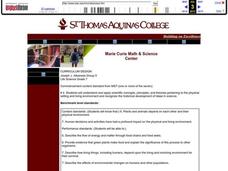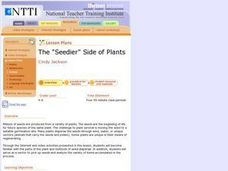Baylor College
Needs of Plants
What better way to learn about plant life than by creating a class garden? Young botanists start with a brief discussion about radishes before planting seeds and watching them grow. To determine the importance of water,...
Baylor College
Do Plants Need Light?
Turn your classroom into a greenhouse with a lesson on plant growth. First, investigate the different parts of seeds, identifying the seed coat, cotyledon, and embryo. Then plant the seeds and watch them grow! Measure the new plants...
Curated OER
Parts of a Plant
First graders discover the parts of a plant. In this science lesson, 1st graders identify and label the parts of a plant and record their findings on a word processor.
Curated OER
How Plants Spice Up Our Lives
Third graders study plants. For this biology lesson plan, 3rd graders label and identify parts of plants, identify spices obtained from plants, and determine what part of a plant a spice comes from by using taste, touch, smell and sight.
Curated OER
Eating Plants
Learners identify parts of a plant. In this life science lesson, student groups locate the leaves and fruits on vegetables, then find the roots. Lesson includes extension activities and background teacher information.
Curated OER
To Eat or Not to Eat?
Young scholars identify various parts of plants and determine which parts people eat. They conduct a celery stalk experiment in which they determine the value and use of the stem, and how it helps the plant to meet its needs. Students...
Curated OER
Plants and Animals
Seventh graders discover the interconnectedness of plants and animals in ecosystems. In groups, they create a food web and discuss the problems when one link of the chain is broken. To end the lesson, they set up a balanced environment...
Berkshire Museum
The Three Life-Giving Sisters: Plant Cultivation and Mohican Innovation
Children gain first-hand experience with Native American agriculture while investigating the life cycle of plants with this engaging experiment. Focusing on what the natives called the Three Sisters - corn, beans, and squash - young...
Baylor College
What's Is Soil Made Of?
It's time to roll up those sleeves and get a little dirty in the second lesson of this series on the science of food. Investigate where plants and animals get the minerals they need to live in this two-part exploration of soil. First,...
Curated OER
Plants and Ecosystems
The relationships within and between ecosystems can be explored. after examining an area for living and non-living things students complete the same examination in the forest ecosystem. Students identify abiotic and biotic elements in an...
Curated OER
What Parts Are There to a Plant?
Young scholars identify and sort plant parts through hands-on activities and group discussions and then work with magnifying lenses and tape measures to document their observations on a student sheet.
Curated OER
Yummy Plant Parts
Middle schoolers examine plant parts. For this botany lesson, students examine various edible plants and how their adaptations help them to grow. They observe stems, leaves, roots and flowers of plants and discuss the relationship...
Curated OER
How Plants Help Us Breathe
Third graders discuss how humans breathe and how plants help us to stay alive. In groups, they identify and label the different parts of plants and describe their functions. They compare and contrast the ways plants and animals breathe...
Curated OER
Growing plants
Students explore plants and recognize that they are living things that require light and water to grow; students identify, name and match the parts of plants.
Curated OER
Parts of the Plants
Second graders discuss as a class what they know about plants viewing several pictures of plants as well as a tree poster. They work in groups to observe a flowering plant which is removed from a pot with the soil brushed away and is...
Curated OER
Stomata: Microscopic Openings that Let Plants Breathe
Young scholars participate in a lab experiment to observe and measure the opening and closing of stomata. They focus on photoperiod, locate and identify stomata on a leaf and explain the role of stomata in the daily functioning of a plant.
Curated OER
Eat Your Plants
Students explore fruits and vegetables. In this fruits and vegetables lesson, students work in small groups investigating plant parts. Students discover that fruits and vegetables originate from different parts of plants.
Curated OER
Growing Plants
Students explore plants and recognize that they are living things that require light and water to grow. In this online plant biology activity, students identify, name and match the parts of plants. Extension activities and suggested...
Curated OER
Plant Parts We Eat
I bet the kids in your class will love to eat their vegetables after an engaging lesson about edible plants. They read information about vegetables and edible plants, sort vocabulary words, identify plant parts, measure and graph the...
Curated OER
Discovering Plants With Lewis and Clark
Students research plants and examine populations in ecosystems.
Curated OER
Helping Plants Grow Well
Young scholars investigate the effect of water, temperature, and light on plant growth. In this plant lesson, students identify the parts of the plant and participate in an online activity. The website is included in this lesson plan.
Curated OER
Parts of a Plant
Students explore biology by listening to an in-class lecture. In this plant science lesson, students sing songs with their classmates regarding anatomical parts of a plant and create plants from arts and crafts materials. Students listen...
Curated OER
Unique Plants of the Biomes
Students examine how the earth is divided into different biomes that are characterized by a distinctive climate. In this earth's surface lesson students identify adaptations of plants in specific biomes.
Curated OER
The "Seedier" Side of Plants
Young scholars demonstrate seed dispersal vectors through role-play, analyze seed types, identify plant parts, list seven conditions plants need in order to grow, and describe how seeds travel.























